The Intercept's Bad Track Record Gets Even Worse as New Whistleblower Outed
Former FBI agent Terry James Albury has been charged with leaking classified government information to the online publication The Intercept.

MINNEAPOLIS – On Wednesday, Minnesota Public Radio (MPR) reported that former Minneapolis-based FBI agent Terry James Albury had been charged with leaking classified government information to the online publication The Intercept. Albury’s legal defense, led by Jane Anne Murray and Joshua Dratel, identified him as a whistleblower, stating that his decision to leak the documents was “driven by a conscientious commitment to long-term national security and addressing the well-documented systemic biases within the FBI.”
Albury’s defense also noted that he has accepted “full responsibility for the conduct set forth in the Information,” referencing the fact that the document charging Albury was a two-page felony information. As noted by the Star Tribune, such a document usually signals an imminent guilty plea.
Albury had previously worked as a liaison on counter-terrorism matters at the Minneapolis-St. Paul International Airport. He has been charged with one count of “knowingly and willfully” transmitting documents and information related to national defense to a news organization and one count of refusing to hand over documents in his possession to the government upon request.
While the FBI warrant filed against Albury does not explicitly name The Intercept, MPR revealed that the documents described in the search warrant exactly match a cache of FBI documents used in The Intercept’s article series titled “The FBI’s Secret Rules,” published in January 2017. Albury is alleged to have possessed and shared the documents with a news outlet between February 2016 and January 2017. The documents examine the expansion of, as well as the questionable tactics used by, the FBI since the attacks of September 11, 2001. The Intercept’s current editor, Betsy Reed, stated that the publication does not discuss anonymous sources.
Former FBI special agent and whistleblower Coleen Rowley — who retired after 24 years after having opposed the invasion of Iraq and exposed the agency’s mishandling of information — told MintPress that she was “kind of surprised that FBI informant guidelines,” such as those allegedly leaked by Albury, “are now considered secret as, if I remember right, most of the informant guidelines were not classified when I worked there [up to and including 2004]. But after 9-11, things began to rapidly change, so I am guessing they have overly/improperly classified them [these types of documents].”
Rowley, who like Albury worked in Minneapolis during her time at the FBI, continued that “the informant program was replete with problems because there was no oversight” during her years at the FBI and that “Albury was probably trying to bring systemic problems [in the FBI] to the public. That makes him a true whistleblower.”
The Intercept fails to protect its source
Other information contained in the complaint against Albury has led some to suggest that The Intercept was responsible for outing or “burning” Albury as a confidential source. According to the FBI, The Intercept made two Freedom of Information Act (FOIA) requests in March 2016. Both of those requests contained specific information identifying the names of the documents that were not publicly available.
Previously sealed FBI search warrants show that these FOIA requests led the FBI to link references contained in the requests to Albury’s activity on FBI information systems. This led the FBI to conclude that “the classified and/or controlled nature of the documents indicates the News Outlet obtained these documents from someone with direct access to them” and that The Intercept had the documents prior to making the FOIA requests and then “used its knowledge of such documents to create the FOIA requests.”
An FBI review conducted at a later date found that Albury had taken 11 screenshots of one of the documents specifically named in the FOIA requests by The Intercept and was one of only 16 individuals to access the document between August 2011 and March 29, 2016 – when the FOIA request was filed. The warrant also added that “to date, a review of FBI records has revealed no indication that any individual other than ALBURY both accessed this document and conducted cut and paste action.”
The FBI has asserted that Albury was found to have accessed more than two-thirds of the leaked documents published by The Intercept and had been caught taking photos of other secret documents months later in the summer of 2017.
Interestingly, The Intercept report referencing Albury’s arrest does not make any mention of the FOIA requests mentioned in the FBI’s case against Albury. A statement regarding Albury’s arrest from First Look Media, The Intercept’s parent company, mentions neither the FOIA requests nor the involvement of The Intercept.
Second whistleblower burned in less than a year
Albury is not the first source to have been burned by poor journalistic practices and source protection methods at The Intercept. Just nine months ago, Reality Leigh Winner, a now 26-year-old federal contractor, was arrested for allegedly leaking a classified NSA document to The Intercept that was related to an investigation of an alleged Russian military intelligence hacking operation targeting the U.S. Ever since her initial arrest, Winner has been held in pre-trial detention and has been denied bail. She faces up to 10 years in prison under the Espionage Act and her trial is set to begin in October of this year.
While The Intercept has long maintained that it was unaware that Winner was the source of the document, FBI documents have shown that negligence helped lead federal investigators straight to Winner. The Intercept’s scanned images of the intelligence report that Winner leaked contained tracking dots – a type of watermark – that, according to Rob Graham of the Errata Security blog, showed “exactly when and where documents, any document, is printed.” These dots make it easy to identify a printer’s serial number as well as the date and time a document was printed. As Graham noted, “Because the NSA logs all printing jobs on its printers, it can use this to match up precisely who printed the document.”
In addition, and perhaps most concerning of all, the FBI warrant also notes that the reporter in question – who is unnamed in the document – contacted a government contractor with whom he had a prior relationship and revealed where the documents had been postmarked from – Winner’s home of Augusta, Georgia – along with Winner’s work location. He also sent unedited images of the documents that contained the tracking dot security markings that allowed the document to be traced to Winner.
Despite that, The Intercept has never named the reporter who was responsible and has taken minimal responsibility as an organization for her arrest. However, Pierre Omidyar – the billionaire backer of The Intercept, who has a noted disdain for transparency organizations like WikiLeaks – has directed First Look Media, The Intercept’s parent company, to support Winner’s legal defense via its Press Freedom Defense Fund. It remains to be seen if Omidyar and First Look Media will offer to support Albury’s defense.
While the identity of the reporter mentioned in the FBI warrant remains unknown, the published report that used the document leaked by Winner has four authors – two of whom, Matthew Cole and Richard Esposito, were once involved in a case against CIA whistleblower John Kiriakou. Cole still writes regularly for The Intercept while Esposito’s last story for the publication was the report containing the Winner document. When Winner’s arrest was announced, Kiriakou specifically singled out Cole as having not only misled him, but also played a likely role in incriminating him. Kiriakou spent nearly two years in prison for exposing the CIA’s torture program.
Kiriakou, in an email to MintPress stated:
"I am appalled that yet another whistleblower in touch with The Intercept has been outed and arrested. The Intercept has a track record on whistleblowers that it should be ashamed of. Reality Winner was in touch with The Intercept and was arrested and charged with espionage. Terry Albury apparently was in touch with The Intercept and was arrested and charged with espionage. I was arrested and charged with espionage after being in touch with Matthew Cole, now an Intercept reporter. If The Intercept cannot or will not protect the identity of its sources, it should not be in the business of journalism. Indeed, perhaps The Intercept should walk away from national security reporting before its lack of journalistic professionalism ruins any more lives.”
Rowley, for her part, took a different view of the situation. She stated that “whistleblowing is so difficult these days for a lot of different reasons. … Both the whistleblower and the reporter are really up against some huge challenges. It’s probably not possible [anymore] to guarantee secrecy. If any reporter is promising that kind of thing, they are probably not being honest because the government has really doubled down on the ‘insider threat.’”
However, Rowley also expressed skepticism about recent hires at The Intercept and also asserted:
"[The Intercept] should be a lot more forthright about this [Albury arrest] because this issue [whistleblowers, leaks] is their bread and butter. … That’s The Intercept’s brand and if they now are falling down on that job they should be as forthright as they could be about this mess and not just blaming [Attorney General Jeff] Sessions and Trump – the crackdown on whistleblowers has been going on for a long time.”
She also expressed concern about the SecureDrop platform that The Intercept promotes.
Pierre Omidyar and the Snowden documents
The news that another whistleblower in contact with The Intercept has been arrested is concerning, as it suggests that source protection at the outlet is not given the importance it deserves, especially when those sources are risking their freedom to get vital information out to the public. However, other actions taken by The Intercept in its short history have also raised concern and have been the subject of extensive reporting at MintPress News as well as other publications, such as [Pando].
Much of the scrutiny, aside from the arrest of Winner and now Albury, has been aimed at The Intercept’s billionaire backer, Pierre Omidyar, who is very well-connected to various agencies of the U.S. government and powerful politicians, including past presidents; has funded U.S.-backed regime-change efforts abroad; and still funds USAID, particularly its overseas program aimed at “advancing U.S. national security interests” abroad. Omidyar also has a history of attacking the transparency organization WikiLeaks and has publicly stated that, in the case of those who leak documents to news outlets, those outlets “should help catch the thief.”
Concern and speculation related to Omidyar’s role at The Intercept has proliferated due to its glacial publishing of the Snowden documents. Indeed, The Intercept was founded with the mission to “aggressively report” on the leaked NSA documents Edward Snowden provided to Intercept co-founders Laura Poitras and Glenn Greenwald. However, in the years since The Intercept's founding, more than 90 percent of those documents leaked by Snowden have yet to be made publicly available, leading some to accuse the publication of having “privatized” leaks originally intended for public scrutiny.
Snowden, however, has not publicly spoken about the slow pace of the releases and, in the past, has said he delegated all decision-making regarding the release of the documents to the journalists to whom he gave his cache. Snowden’s lack of concern could also potentially be due to the fact that he is now the President of the Freedom of the Press Foundation (FPF), which has received hundreds of thousands of dollars from Omidyar since 2014. The majority of the FPF’s directors, aside from Snowden, either work for First Look Media – the Omidyar-owned parent company of The Intercept – or for the Electronic Frontier Foundation (EFF) – which has received significant funding from the Omidyar network since 2004.
Another area of contention related to the release – or lack thereof – of the Snowden documents has been the timing with which some documents have been released. In two recent cases, The Intercept published Snowden documents that would have had a major impact had they been released earlier. In one instance, The Intercept published a document last year on the Syrian conflict that revealed that some Syrian “rebel” opposition groups were taking marching orders from the Kingdom of Saudi Arabia. As MintPress reported at the time, The Intercept published this document only after the U.S. State Department itself began to report more honestly on the nature of these so-called “rebels.”
A more recent example of this occurred little over a week ago. On March 20, The Intercept published Snowden documents that revealed how the NSA worked to illegally “track down” Bitcoin users, naming tracking the movements of Bitcoin as a “#1 priority.” However, the information in this document was released only after Bitcoin had become a mainstream phenomenon. It also was released after it could have helped defend Ross Ulbricht of Silk Road fame.
As The Intercept itself noted:
"Part of his [Ulbricht’s] unsuccessful defense was the insistence that the FBI’s story of how it found him did not add up, and that the government may have discovered and penetrated the Silk Road’s servers with the help of the NSA — possibly illegally. The prosecution dismissed this theory in no uncertain terms.”
Thus, if this document had been released before or during Ulbricht’s trial, it could have impacted the outcome. In 2016, Ulbricht was sentenced to life in prison without parole and his legal team is seeking to appeal that decision. Interestingly, one of Ulbricht’s lawyers, Joshua Dratel, is currently representing Terry Albury.
"Welcoming” whistleblowers should not mean outing them
Despite its sizable financial resources and the number of employees who are dedicated to source protection, The Intercept’s practices have led to the arrest of a source — not once but twice — in less than a year. In the cases of Winner and now Albury, it has not taken full responsibility for its role in outing either of these unfortunate whistleblowers, but still seeks to present itself as a trustworthy organization that “welcomes whistleblowers.” Along with past calls to scrutinize the publication — as well as its billionaire backer — Albury’s arrest should serve as a fresh reminder that The Intercept has largely become part of the establishment journalism that it purports to stand against, and is hardly the haven for whistleblowers that it has presented itself to be.
Top Photo | A screenshot of the feature photo from the Intercept story which eventually led to former Minneapolis-based FBI agent Terry James Albury’s arrest.
Whitney Webb is a staff writer for MintPress News who has written for several news organizations in both English and Spanish; her stories have been featured on ZeroHedge, the Anti-Media, and 21st Century Wire among others. She currently lives in Southern Chile.
Written by Whitney Webb. // This article is Creative Commons. // See the original.

Find us:
Online --> MintPressNews.com
On Twitter --> @MintPressNews
On Facebook --> @MintPressNewsMPN
On Instagram --> @MintPress
On Patreon --> Patreon.com/MintPressNews
Written by Whitney Webb. // This article is Creative Commons. // See the original.

Find us:
Online --> MintPressNews.com
On Twitter --> @MintPressNews
On Facebook --> @MintPressNewsMPN
On Instagram --> @MintPress
On Patreon --> Patreon.com/MintPressNews
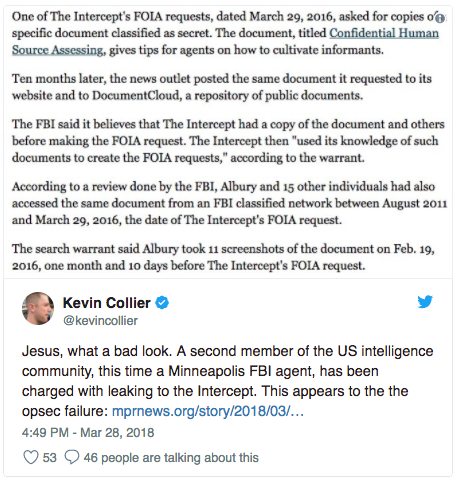
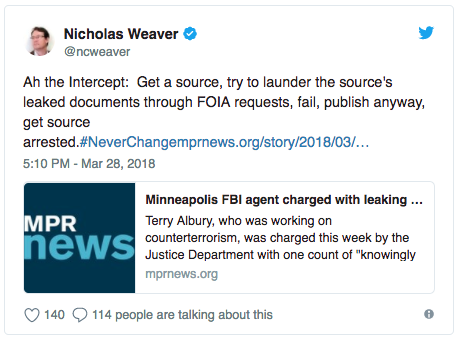
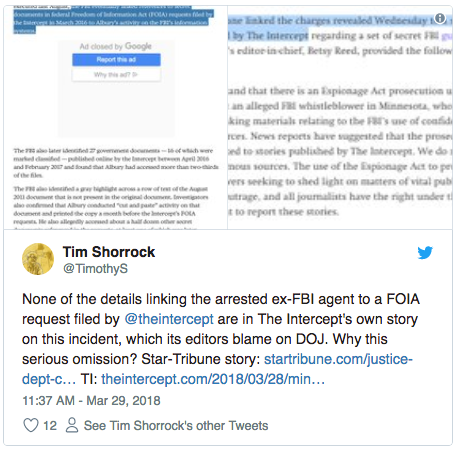
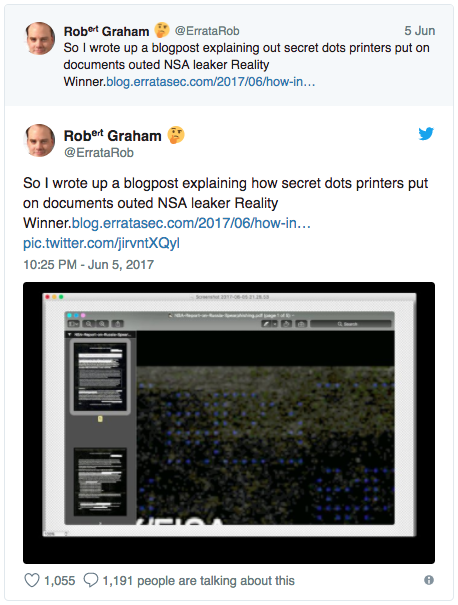
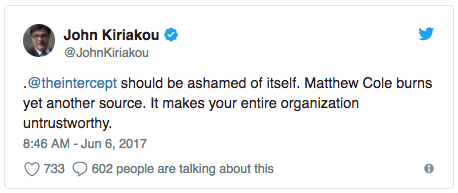
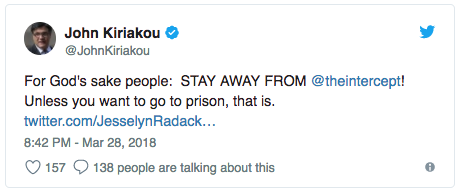
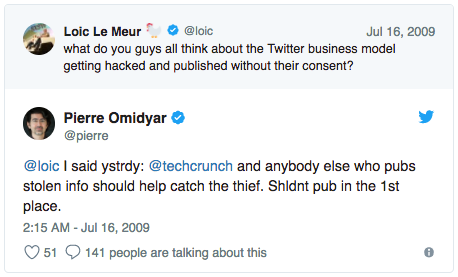
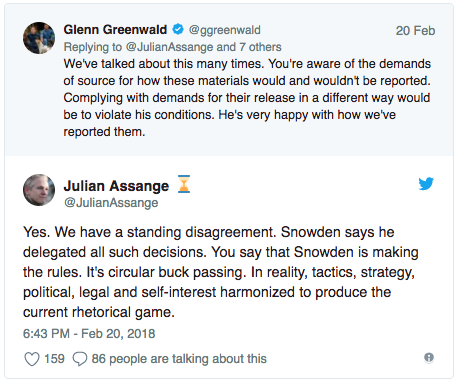
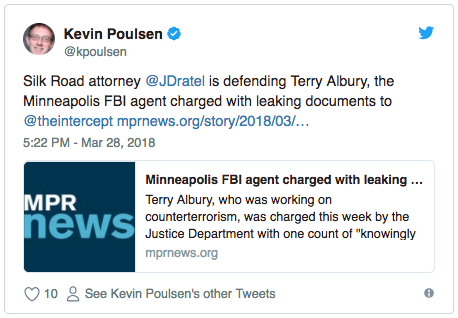
I wish Glenn Greenwald would get the hell out of there.